Fürstenau, Switzerland
Fürstenau (Romansh: Farschno) is a municipality in the Viamala Region in the Swiss canton of Graubünden and the smallest town to hold city rights with a market right received from Charles IV, Holy Roman Emperor in 1354.
Fürstenau | |
|---|---|
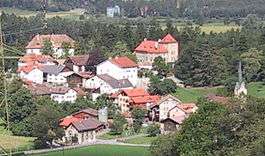 | |
 Coat of arms | |
Location of Fürstenau 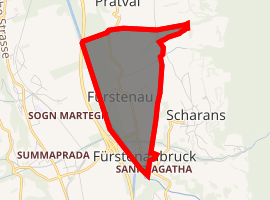
| |
 Fürstenau 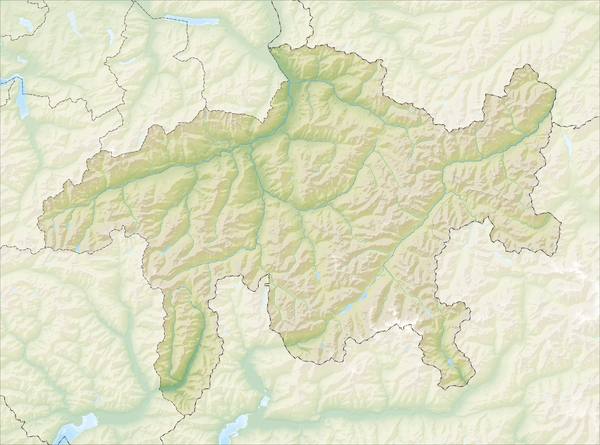 Fürstenau | |
| Coordinates: 46°43′N 9°26′E | |
| Country | Switzerland |
| Canton | Graubünden |
| District | Viamala |
| Area | |
| • Total | 1.32 km2 (0.51 sq mi) |
| Elevation | 650 m (2,130 ft) |
| Population (2018-12-31)[2] | |
| • Total | 353 |
| • Density | 270/km2 (690/sq mi) |
| Postal code | 7414 |
| SFOS number | 3633 |
| Surrounded by | Almens, Cazis, Pratval, Scharans, Sils im Domleschg, Thusis |
| Website | www SFSO statistics |
History
Fürstenau is first mentioned in 1257 as Fúrstenowo and Furstinowe. Originally there were two medieval tower houses or guard towers and a bishop's house in the area that became Fürstenau.[3] The Bishop's summer residence is of course the reason for the city right.
Geography
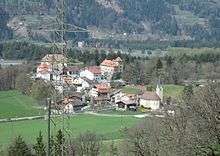
Fürstenau has an area, as of 2006, of 1.3 km2 (0.50 sq mi). Of this area, 52.3% is used for agricultural purposes, while 32.3% is forested. Of the rest of the land, 9.2% is settled (buildings or roads) and the remainder (6.2%) is non-productive (rivers, glaciers or mountains).[4]
Before 2017, the municipality was located in the Domleschg sub-district of the Hinterrhein district, after 2017 it was part of the Viamala Region.[5] It consists of the village of Fürstenau and Fürstenaubruck, on the right side of the valley.
Demographics
Fürstenau has a population (as of 31 December 2018) of 353.[6] As of 2008, 8.1% of the population was made up of foreign nationals. Over the last 10 years the population has grown at a rate of 12.5%.[4]
As of 2000, the gender distribution of the population was 49.4% male and 50.6% female.[7] The age distribution, as of 2000, in Fürstenau is; 29 people or 9.3% of the population are between 0 and 9 years old. 16 people or 5.1% are 10 to 14, and 13 people or 4.2% are 15 to 19. Of the adult population, 27 people or 8.7% of the population are between 20 and 29 years old. 51 people or 16.4% are 30 to 39, 36 people or 11.6% are 40 to 49, and 44 people or 14.1% are 50 to 59. The senior population distribution is 25 people or 8.0% of the population are between 60 and 69 years old, 28 people or 9.0% are 70 to 79, there are 33 people or 10.6% who are 80 to 89, and there are 9 people or 2.9% who are 90 to 99.[8]
In the 2007 federal election the most popular party was the SPS which received 32.5% of the vote. The next three most popular parties were the SVP (30.4%), the FDP (27.2%) and the CVP (9.5%).[4]
In Fürstenau about 81% of the population (between age 25-64) have completed either non-mandatory upper secondary education or additional higher education (either university or a Fachhochschule).[4]
Fürstenau has an unemployment rate of 1.85%. As of 2005, there were 11 people employed in the primary economic sector and about 4 businesses involved in this sector. 2 people are employed in the secondary sector and there is 1 business in this sector. 133 people are employed in the tertiary sector, with 15 businesses in this sector.[4]
The historical population is given in the following table:[3]
| year | population |
|---|---|
| 1803 | 107 |
| 1850 | 304 |
| 1900 | 235 |
| 1950 | 253 |
| 1980 | 198 |
| 2000 | 311 |
Sights
Fürstenau has three Swiss Heritage Sites of National Significance.
Heritage sites of national significance
The Haus Stoffel, Oberes Schloss (Upper Castle) and Unteres Schloss (Lower Castle, also known as the Bishop's Castle) are listed as Swiss heritage sites of national significance.[9] As of 2014, the Oberes Schloss is an inn with a Michelin 3-star restaurant.
- Stoffel House
- Oberes Schloss (Upper Castle)
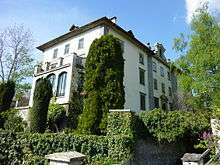 Unteres Schloss (Lower Castle)
Unteres Schloss (Lower Castle)
Languages
The municipality is predominantly German-speaking, with a small Romansh-speaking minority. As of 2000, 92.3% speaks German, with Romansh being second most common ( 3.2%) and Italian being third ( 1.9%).[4]
| Languages in Fürstenau | ||||||
| Languages | Census 1980 | Census 1990 | Census 2000 | |||
| Number | Percent | Number | Percent | Number | Percent | |
| German | 170 | 85.86% | 243 | 89.66% | 287 | 92.28% |
| Romanish | 13 | 6.57% | 15 | 5.54% | 10 | 3.22% |
| Italian | 10 | 5.05% | 4 | 1.48% | 6 | 1.93% |
| Population | 198 | 100% | 271 | 100% | 311 | 100% |
References
- "Arealstatistik Standard - Gemeinden nach 4 Hauptbereichen". Federal Statistical Office. Retrieved 13 January 2019.
- "Ständige Wohnbevölkerung nach Staatsangehörigkeitskategorie Geschlecht und Gemeinde; Provisorische Jahresergebnisse; 2018". Federal Statistical Office. 9 April 2019. Retrieved 11 April 2019.
- Fürstenau in German, French and Italian in the online Historical Dictionary of Switzerland.
- Swiss Federal Statistical Office Archived January 5, 2016, at the Wayback Machine accessed 02-Oct-2009
- Swiss Federal Statistical Office - Amtliches Gemeindeverzeichnis der Schweiz - Mutationsmeldungen 2016 accessed 16 February 2017
- Swiss Federal Statistical Office - STAT-TAB, online database – Ständige und nichtständige Wohnbevölkerung nach institutionellen Gliederungen, Geburtsort und Staatsangehörigkeit (in German) accessed 23 September 2019
- Graubunden in Numbers Archived September 24, 2009, at the Wayback Machine (in German) accessed 21 September 2009
- Graubunden Population Statistics Archived August 27, 2009, at the Wayback Machine (in German) accessed 21 September 2009
- Swiss inventory of cultural property of national and regional significance Archived May 1, 2009, at the Wayback Machine 21.11.2008 version, (in German) accessed 02-Oct-2009
| Wikimedia Commons has media related to Fürstenau. |
External links
- www.fuerstenau.ws
- Fürstenau, Switzerland in German, French and Italian in the online Historical Dictionary of Switzerland.